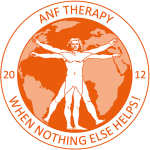Do you often feel like you’re stuck with an endless cold? Persistent congestion, facial pressure, headaches, and fatigue that never seem to fade? If so, you may be one of the millions affected by sinusitis. Nearly 30 million adults in the U.S. are diagnosed with sinusitis each year, making it one of the most common health concerns. Sinusitis can cause severe discomfort; if left untreated, it can disrupt your daily life.
ANF Therapy®️ is the newest treatment for sinusitis. It works on the principles of frequency medicine. It uses ANF Devices to emit frequencies and strengthen the neurological frequencies of your body. This therapy is a highly effective, non-pharmacological, and non-invasive treatment method that targets the root cause of your symptoms, aiming to promote natural healing and provide quick relief.
What is sinusitis?
- Frontal sinuses (forehead)
- Maxillary sinuses (cheekbone)
- Ethmoid sinuses (between the eyes)
- Sphenoid sinuses (deeper within the skull)
They are responsible for creating mucus, which filters air and prevents dust particles from reaching your lungs. However, viral or bacterial infections can fill your sinuses with fluid and become inflamed. This results in blockage of these cavities, which allows germ growth. This, in turn, causes infection, leading to symptoms like stuffy nose (congestion) and pain.Sinusitis is also known as rhinosinusitis, as it often affects both the nasal passages and sinuses. Typically, sinusitis affects one or two pairs of sinuses, such as the maxillary (cheek) or frontal (forehead) sinuses. However, in more severe cases, all four pairs of sinuses can become inflamed simultaneously, known as pansinusitis.
What are the types of sinusitis?
Based on the duration and cause, sinusitis can be divided into various types.
By duration:
Categories (depending on how long you’ve been dealing with sinusitis) include:
- Acute sinusitis is the most common form, usually caused by a viral infection such as the common cold. It typically lasts up to four weeks.
- Subacute sinusitis: If symptoms persist beyond the acute phase, it’s subacute sinusitis. However, it lasts for less than 12 weeks.
- Chronic sinusitis: If symptoms last more than 12 weeks, it’s chronic sinusitis. Most often, bacteria are the cause.
- Recurrent acute sinusitis occurs when someone experiences acute sinusitis four or more times a year, with each episode lasting at least a week.
By cause:
Depending on the cause, the types of sinusitis are:
- Viral sinusitis: Most often, sinusitis occurs due to viruses causing colds. Around 90% of people with normal colds have viral sinusitis. It usually comes with symptoms like a runny nose, congestion, and facial discomfort. But these symptoms tend to improve within a week or so.
- Bacterial sinusitis: Bacteria can cause or worsen sinusitis after a viral infection. If symptoms persist for more than ten days or worsen after the initial improvement, it may be bacterial sinusitis.
- Fungal sinusitis: This is a rare and more severe form of sinusitis caused by fungus. People with weakened immune systems are more likely to get it.

What are the symptoms of sinusitis?
Here are some common symptoms of sinusitis:
- Stuffy or blocked nose
- Facial pain or pressure (usually around the eyes, forehead, or nose)
- Thick yellow or green nasal discharge
- Postnasal drip (mucus dripping down the throat)
- Cough
- Fatigue
- Teeth or ear pain or pressure
- Bad taste in the mouth
- Bad breathe (halitosis)
What are the causes of sinusitis?
- Common cold
- Influenza
- Bacteria such as Haemophilus influenza bacteria, streptococcus pneumonia bacteria, and Moraxella catarrhalis bacteria
- Seasonal and nasal allergies
- Irritants like polluted air, dust, smoke, and animal danger
Dr. Mikel H-G Hoff states that sinusitis can be caused by an imbalance in the body’s lymphatic circulation. ANF Therapy®️ improves lymphatic circulation with the help of ANF Devices to treat sinusitis effectively.
What are the risk factors of sinusitis?
You’re at higher risk of getting sinusitis if you have:
- Asthma
- Allergic rhinitis
- Nasal polyps (growths in the nasal passages)
- Deviation in the nasal septum (the tissue dividing the nasal passages)
- Weakened immune systems, such as people with HIV, cancer, or on chemotherapy
- Habit of smoking
- Trauma to the facial area
- Conditions such as cystic fibrosis and ciliary dyskinesia
How to Relieve sinusitis?
Treatment of Sinusitis with ANF Therapy®️:
History:
They will ask questions about your disease. These include the following:- What are your presenting complaints?
- How much pain do you have?
- Does your pain increase when you bend forward?
- Are there any relieving or aggravating factors of your pain?
- Do you have any history of recent upper respiratory tract infections or ear infections?
- Do you have any history of previous Surgery?
- Do you have any previous medical illness?
- Family history
Physical examination:
After taking your history, your ANF healthcare provider will perform a physical examination to assess for signs of sinusitis. It will involve:Inspect your face, nose, throat, neck, and eyes for visible swelling, redness, or other abnormalities that may indicate sinus inflammation or infection.Palpation (gently pressing) of your face and neck to check for warmth, tenderness, or discomfort in the areas over the sinuses, such as the forehead and cheeks.Neurological examination:
Your ANF Therapist will also do your neurological examination to assess the severity of inflammation in the nerves. In this examination, they will palpate your nerves for inflammation or tenderness.Application of ANF Devices:
After taking a detailed history and performing a physical examination, your ANF Therapist will create a personalised treatment protocol according to the severity of your condition. This treatment involves the application of wearable ANF Devices, including anti-inflammatory and antioxidant discs. These devices aim to reduce inflammation and neutralise free radicals in your body, supporting and promoting the natural healing process.Expected outcome:
According to Dr. Mikel H-G Hoff, the founder of ANF Therapy®️, most patients feel an improvement in sinusitis after a few minutes of applying ANF Devices. ANF Therapy®️ aims to reduce pain and symptoms by 50% after the first session. However, response to ANF Therapy®️ may differ in different individuals, depending on the severity of the disease.Follow-up:
Regular follow-ups are essential in treating sinusitis and checking the efficacy of ANF Devices. Your ANF Therapist will guide you on the number of follow-up sessions and treatment duration. You will need to change ANF Devices after 72 hours. Your therapist will create a personalised treatment plan for you and educate you about these changes.
Start your journey with ANF Therapy®️:
ANF Therapy®️ offers an innovative tool for managing sinusitis. By utilising wearable ANF Devices that emit neurological frequencies, ANF Therapy®️ aims to modulate inflammatory responses, promote healing, and support overall well-being related to health. This non-pharmacological therapy provides a safe and effective approach that improves disease outcomes by targeting the root cause. If you’re suffering from sinusitis, consult an ANF Practitioner or find an ANF Therapist to start your treatment with ANF Therapy®️ today!
If you’re a healthcare practitioner and want to enhance your clinical skills with frequency medicine, learn more about the ANF Therapy®️ and ANF Clinical education program by visiting www.anfacademy.com.
How to prevent sinusitis?
While sinusitis can’t be avoided in general, here are some steps you can take to lower the risk:
- Practice good hygiene. Wash your hands often to prevent the transfer of germs or viruses to your mouth and nasal passage.
- Avoid smoking, as it can cause irritation and inflammation in nasal passages.
- Drink a lot of water to keep the mucus thin, which helps drainage.
- Limit exposure to environmental pollutants such as dust and other irritants.
- Use humidifiers since moist air prevents your nasal passages from drying out, reducing the risk of infection.
What are the complications of sinusitis?
If sinusitis is left untreated or becomes severe, it can lead to serious complications, including:
- Facial cellulitis (infection of the skin and tissues of the face)
- Periorbital cellulitis (infection around the eyes)
- Orbital abscess (can affect vision and lead to blindness)
More severe complications include intracranial issues such as:
- Cavernous sinus thrombosis (blood clot in the sinus cavity)
- Epidural or subdural empyema (infections in the spaces around the brain)
- Meningitis (inflammation of the brain’s protective layers)
If you notice no improvement in your symptoms, consult your doctor immediately.
FAQs:
What is the difference between sinusitis and rhinitis (sinusitis vs rhinitis)?
Sinusitis and rhinitis are two different terms with different clinical presentations. In sinusitis, you will feel pain in your face, headache, and have yellow or green discharge from your nose. In contrast, in rhinitis, you have itchy eyes, sneezing, and clear mucus from the nose.
How to unblock the nose?
To unblock a blocked nose during sinusitis, try:
- ANF Therapy®️
- Steam inhalation
- Warm compresses
- Hot showers
- Using a humidifier
How to immediately relieve the sinus pressure?
ANF Therapy®️, along with adequate hydration and warm compresses on your face, can provide immediate relief by reducing swelling and opening up your nasal passage.







